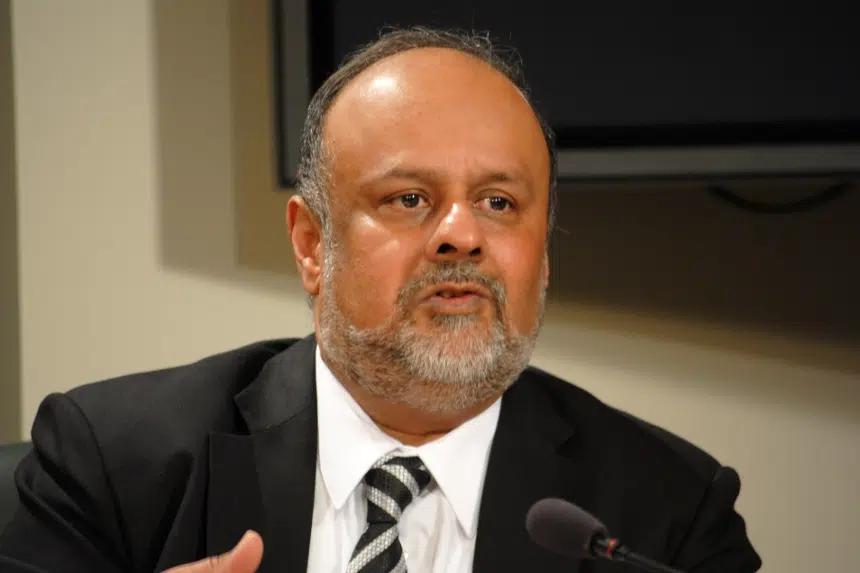Dr. Saqib Shahab had a warning for Canada’s Most Notorious City on Tuesday.
“I think Moose Jaw is on red alert,” Saskatchewan’s chief medical health officer said during a conference call.
Moose Jaw has been reporting more and more cases of COVID-19 and variants of concern of late. On Tuesday, Shahab said the city had 95 active cases, with 10 new cases reported during the day.
While that city’s numbers are not at Regina’s level — the Queen City region announced another 91 new cases Tuesday and now has 1,039 active cases — Shahab said things in Moose Jaw are “very concerning.”
“There are active discussions if further public health measures or orders are required for Moose Jaw,” Shahab said. “But I support the mayor of Moose Jaw who has said, ‘Behave as if you are in Regina.'”
Earlier Tuesday, the Saskatchewan government announced the stricter public health measures put in place March 23 for the Regina region will remain in effect until April 12 — one week later than originally planned.
Shahab pointed out testing numbers are up in the area, which in turn results in higher case numbers. But health officials have seen the test positivity rate in the region drop, which bodes well.
“There’s some silver lining that all these measures in Regina are having an initial effect and nudging case numbers down, but we have to stay the course,” Shahab said.
“If required, even more stringent measures could come into play, but with the current measures that are very stringent — the most stringent we’ve seen in Regina or anywhere in Saskatchewan since March 2020 — we hope things will turn around. But it takes everyone in Regina to comply.”
Shahab suggested people in Moose Jaw should look at the guidelines that are in place in the Regina area and try to emulate them, whether that means limiting indoor gatherings to members of the same household, working from home or ordering meals via curbside pickup from a restaurant.
Moose Jaw’s school divisions already have made the choice to move to remote learning like their Regina counterparts, and the government also has suggested people not travel to or from the Moose Jaw area if it’s not necessary. That recommendation also is in place for the Regina area.
However …
“If the concern continues in Moose Jaw, further restrictions will unfortunately have to be applied — and similarly for other communities in the south of Saskatchewan,” Shahab said.
According to the government, there were 1,575 cases of COVID variants in Saskatchewan on Tuesday. Of those, 1,298 were in the Regina region, 118 were in the south-central zone and 107 were in the southeast — and all of those numbers have increased steadily over the past week.
Shahab was asked why stricter measures weren’t imposed on the Moose Jaw region to make sure it doesn’t experience increased numbers similar to the level currently being seen in Regina.
“We’ve seen throughout the last 13 months that when we put our backs into it, things turn around very quickly and that voluntary adoption of additional measures has to be the mainstay,” he replied.
“When there’s a blizzard, highways aren’t closed always but travel is not recommended. People who have to travel travel, but most stay home — and that’s how you prevent harm to yourself and others. (It’s the) same with COVID.”
Premier Scott Moe added he had faith in the people of the Moose Jaw area to keep case numbers in check.
“Wherever you live, there are significant public health measures and recommendations that are applied to your community and ultimately apply to you and your family household,” Moe said. “We would ask you to be very diligent in following those and if you are in the southeast or in Moose Jaw, we would ask you to go the extra mile.”
AstraZeneca update
The provincial government announced Monday it would be following the recommendations of the National Advisory Committee on Immunization regarding the AstraZeneca vaccine.
Aware there has been a link between the vaccine and blood clots, the province won’t give AstraZeneca to anyone under 55 until more safety reviews are done.
Shahab noted while there have been a few cases worldwide of clotting among women aged 20 to 55, there haven’t been any adverse events reported in Saskatchewan since the AstraZeneca vaccine was doled out at a drive-through clinic in Regina to people 58 and over.
“I have no doubts that as we speak today, AstraZeneca is protecting people in their 60s in the city of Regina who are at high risk of COVID because of the surge,” Shahab said. “I think we need to be reassured that all vaccines, including AstraZeneca, remain very safe.”
Moe said the province is expecting 55,000 AstraZeneca doses over the next three weeks and plans to use them at drive-through clinics in Regina, Moose Jaw, Weyburn, Yorkton and Saskatoon.
The premier added some 180,000 doses of various vaccines are expected to be delivered to the province in the next 20 days. That’s almost the total number of vaccinations done in Saskatchewan to date.
Scott Livingstone, the CEO of the Saskatchewan Health Authority, said the goal is to administer 50,000 doses this week even though the authority has less than half of its vaccination clinics open.
“As we bring on more clinics as vaccine arrives and we also bring on community pharmacies and First Nations communities, our capacity will far exceed the ability of the federal government to supply us with vaccines,” Livingstone said. “When we do get these increased allocations, we’re already prepared.”
As of Tuesday, about 157,000 Saskatchewan residents have made appointments to get vaccinated over the next three weeks. Starting Wednesday at 8 a.m., anyone 60 and over can make a booking.
As well, Moe said letters have been sent to 25,000 clinically extremely vulnerable people in the province to arrange for vaccinations.







